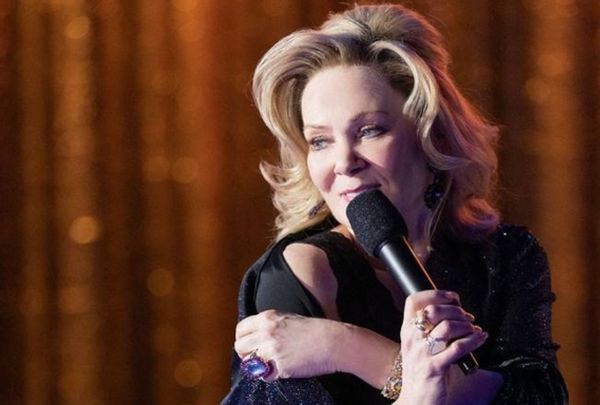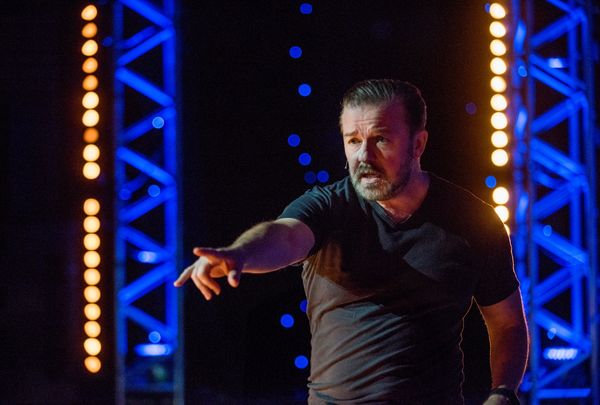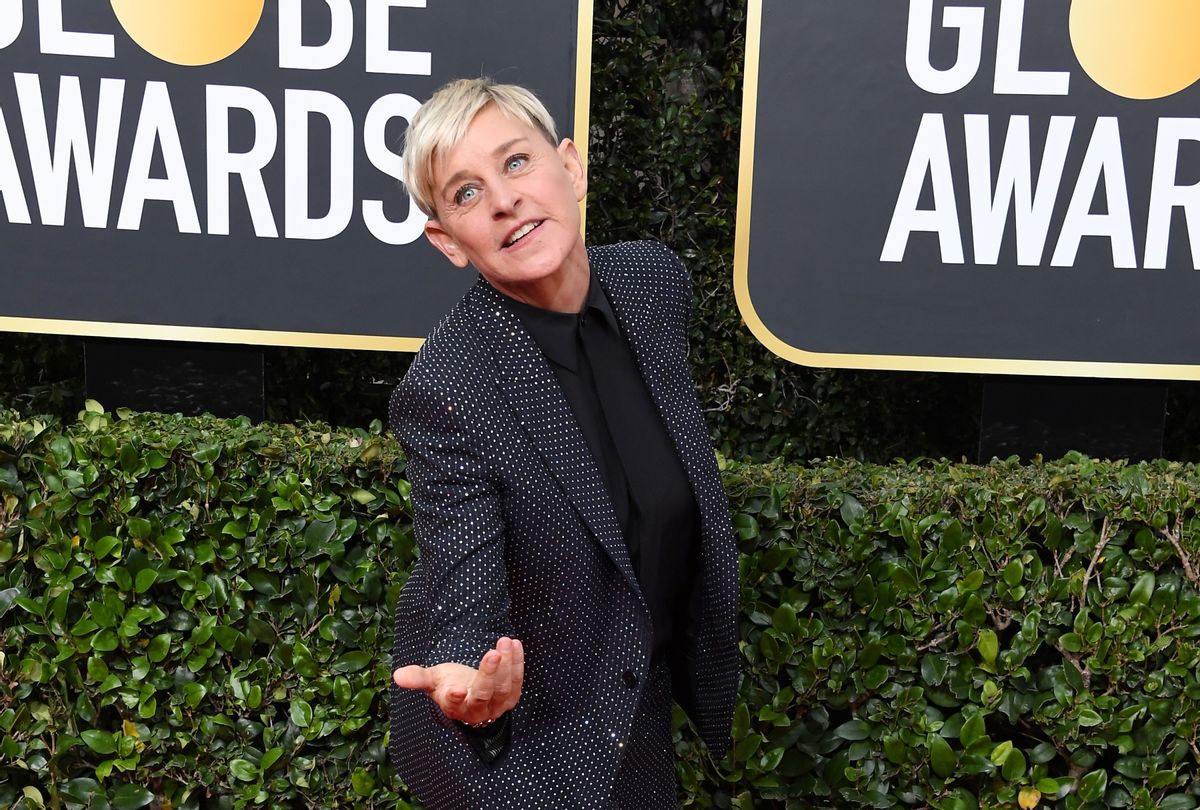"Hacks" acknowledges Ellen DeGeneres' broad influence by having its star comic Deborah Vance (Jean Smart) open her show on a lesbian cruise by dancing awkwardly to Pharrell's "Happy." This is uncharacteristic of Deborah, and her writing partner and protégé Ava (Hannah Einbinder) knows it. Seeing the first shimmy makes Ava blurt, "Ohhh no . . ." as she recognizes the mimicry.
"She's doing Ellen."
But what Deborah does is worse than simple imitation. Ava understands that her boss thinks she's communicating with the audience in some magical language, letting them know she's on their side.
The audience cheers and claps along because they don't know Deborah – not in the way Ava does. Ava's aware that Deborah has spent her career catering to men, gay and straight, clawing her way to success in a field dominated by straight white guys. That means she interprets her fellow passengers' individual gestures of validation and acceptance the wrong way. Like many of her straight male comedian counterparts, she misinterprets their attention as flirting. She thinks they think she's hot.
RELATED: "Hacks" is a generational sucker punch
"Honestly, when I first found out I was booked on a lesbian cruise I was angry," Deborah declares at the top of her act. "But you have welcomed me with open arms, and I am so flattered! And if you know me at all, you know that flattery is my biggest turn-on." The audience applauds.
A beat later Deborah sings out, "I should have known – women know how to treat women!" This nets more thunderous applause . . . the last her set gets. From there she demonstrates that she doesn't know how to treat women, starting with a stereotypical flub about lesbians and golfing before tumbling face-first into some crowd work that incorrectly assumes her audience is horny for her.
To people like Deborah ... Ellen DeGeneres and her talk show represent the solved problem of straight America's tolerant view of gayness.
"This lesbian must be broken!" she brays after her first angry rejection, at which the crowd turns on her. When a lame joke about parallel parking is booed down, she swings back with, "Oh please – it's not a lesbian joke, it's a woman joke! Everyone hates women!" Hours later Deborah and Ava are downgraded from V.I.P. status to dinghy-riding cast-offs forced to exit the voyage mid-sea.
 Jean Smart in "Hacks" (Karen Ballard/HBO Max)All great art translates some version of reality – and in this scene, Deborah exemplifies the frustrating relationship comedians purport to have with people pushing back against aspects of their act that they find objectionable. Point of fact, the content to which the cruise ship's audience takes the highest offense wasn't jokes, it was Deborah's defensive, self-indulgent badgering.
Jean Smart in "Hacks" (Karen Ballard/HBO Max)All great art translates some version of reality – and in this scene, Deborah exemplifies the frustrating relationship comedians purport to have with people pushing back against aspects of their act that they find objectionable. Point of fact, the content to which the cruise ship's audience takes the highest offense wasn't jokes, it was Deborah's defensive, self-indulgent badgering.
However, the fact that Deborah slides into this disaster by channeling DeGeneres' gawky two-step as if it were a universal handshake reveals the writers' understanding of how mainstream, cisgender heterosexual Americans view the exiting talk show host these days, too.
To people like Deborah, an entertainer who built her fortune on playing to the middle, Ellen DeGeneres and her talk show represent the solved problem of straight America's tolerant view of gayness. Think of all the times you may have heard someone expressing they had nothing against "the gays," so long as they don't "rub our faces in it."
Then picture DeGeneres, all grins and sneakers, dancing with her fellow executive producer (as of 2020) Stephen "tWitch" Boss at the top of every show. A Black man and a white gay woman, ebony and ivory in perfect harmony, just like Sir Paul McCartney and Stevie Wonder promised way back when, leading into interviews with Jennifer Aniston (marking a reunion with DeGeneres' first-ever guest), Billie Eilish and Pink.
In Thursday's monologue for "The Ellen DeGeneres Show," the last one she'll ever do for this series, DeGeneres validated that view by pointing out how far she, and therefore we, have come in the 19 years that the show has been on the air.
"When we started this show I couldn't say, 'gay' on the show," she tells the audience. "I said it at home, a lot. 'What are we having for our gay breakfast?' Or, 'Pass the gay salt.' 'Has anyone seen the gay remote?' Things like that, but we couldn't say, 'gay.'"
She continues, "I couldn't say, 'we' because that implied that I was with someone. Sure couldn't say, 'wife,' and that's because it wasn't legal for gay people to get married, and now I say 'wife' all the time."
This episode was recorded on April 28, a full month after Florida's governor Ron DeSantis signed the "Parental Rights in Education" bill, better known as "Don't Say Gay," into law. But DeGeneres' monologue doesn't specifically mention this or any other anti-gay, anti-transgender legislation slithering its way through state legislatures.
There's the very real possibility that the conservative-skewing Supreme Court may overturn the legalization of same-sex marriage too, but there was no mention of that either. When DeGeneres points out that she says "wife" all the time, the camera simply panned over to show her glamorous spouse Portia de Rossi warmly smiling and nodding as the people around her applaud this accomplishment.
A few lines later DeGeneres observes, "What a beautiful, beautiful journey that we have been on together. And if this show has made you smile, if it has lifted you up, when you're in a period of some type of pain, some type of sadness, anything that you're going through, then I have done my job."
RELATED: The problem with Ellen DeGeneres is that she made "be kind" the unattainable goal of her brand
Well, sure. Succeeding in daytime talk means appealing to the broadest audience possible, which DeGeneres commodified by making "be kind" her motto and the show's unstated compass. But in 2020, after Buzzfeed News revealed multiple claims of a toxic workplace environment behind the scenes that included sexual misconduct and harassment, and alleged that the host turned a blind eye to their complaints, that front crumbled.
DeGeneres ends her show in another moment of drastically higher stakes for LGBTQ+ people.
Along with that, people began looking more closely at the way DeGeneres used her influence to gloss over other public figures' mistakes. One of the most famous was the position she took on her show in 2019 after Kevin Hart pulled out of that year's Oscars hosting gig rather than apologize again for a string of homophobic tweets that resurfaced.
DeGeneres invited Hart on her show and informed the world that "as a gay person" she had forgiven him, before demanding the Academy reinstate him as host.
Matt Brennan published a tremendous analysis of DeGeneres' rise and fall in the Los Angeles Times in which he explains why this moment, in his words, "might be more striking for what it says about DeGeneres than what it says about Hart":
Slipping with breathtaking, almost comic alacrity between performance and personality, the talk-show host's defense of her guest hinged not on his decency, his regret, even their friendship, but on . . . his performance in the movie 'The Upside.'
. . . To mistake a fellow celebrity's role in a $100-million tearjerker for moral rectitude is a peculiarly Hollywood brand of category error; it's as if DeGeneres' muscle memory for the promotional interview could not adjust to the demands of the moment.
Three years later DeGeneres ends her show in another moment of drastically higher stakes for LGBTQ+ people. Unfortunately, by talking her way around taking a stand against the heightening wave of anti-gay bigotry, she leaves us with the impression of siding with the famous and powerful over people who might benefit from an influential demonstration of kindness.
DeGeneres says she wants to lay low for a little while before doing something again, saying she doesn't know what that is. Aniston encourages her to return to live stand-up – a broad and varied field that includes in some corners where transphobic jokes are all the rage. Ricky Gervais agrees with her position on Hart in his new Netflix special "Super Nature," which he opens with an explanation that nobody should take him seriously before unleashing a river of jokes about "the new women . . . the ones with beards and cocks. They're as good as gold; I love them!"
 Netflix 2018 comedy special "Ricky Gervais: Humanity" (Ray Burmiston/Netflix)
Netflix 2018 comedy special "Ricky Gervais: Humanity" (Ray Burmiston/Netflix)
To him, anyone condemning punchlines about transgender people is virtue signaling, "trying to bring people down to raise their own status."
Gervais, who has hosted the Golden Globes many times, has a large constituency of fans, as does Dave Chappelle, whose streaming special "The Closer" made headlines for its transphobic humor and inspired a Netflix employee walk-out. Chappelle only doubled down after that, responding to being assaulted on stage by riffing that his attacker was "a trans man." (The suspect is not.)
Gervais lists the things he jokes about in his new set, including "AIDS, famine, cancer, the Holocaust, rape, pedophilia . . . but the one thing you mustn't joke about is identity. The one thing you should never joke about is the trans issue. They just want to be treated equally. I agree! That's why I include them."
How charitable. Except for the fact that the transgender community is violently under siege. Perhaps Gervais wasn't aware of recently passed laws in Idaho and Alabama criminalizing gender-affirming health care for transgender children, or a Texas law requiring medical professionals and teachers to report parents helping their children to receive such care to the Texas Department of Family and Protective Services (DFPS). But Bill Maher is.
Less than a week ago Maher went off on a nine-minute, 21-second anti-trans tirade titled "Along for the Pride" on an episode of his HBO series "Real Time," scoffing at the notion of gender-affirming medical care for children who identify as transgender, positing that some kids are claiming to be trans because it's "trendy."
Comics love the equal opportunity offender argument, except when people point out that not everyone they're joking about has equal power. There are entire corporate apparatuses dedicated to eradicating AIDS, eliminating famine, and cancer research; there are able comedians who have demonstrated that is it possible to joke about these issues, and rape, and worse, without dehumanizing people in the process.
If a performer can't find a way to do that, at the very least they can use their reach to lend a voice to people who are suffering instead of repackaging the terminologies used against them as just jokes.
Want a daily wrap-up of all the news and commentary Salon has to offer? Subscribe to our morning newsletter, Crash Course.
Meanwhile in the latest episode of "Hacks" a wiser woman, albeit one who doesn't exist, has a revelation that probably would have served DeGeneres well, along with all the other comics mentioned here.
"I need to make more fun of myself. . . . I was never the butt of the joke. It was the caricature of myself that was," Deborah tells Ava after she destroys at a show where she ditches her woe-is-me flavor of confessional humor. "I have to admit what I did wrong, too. . . . I have to hold myself accountable! I am a bully who's been thinking of myself as the victim. I mean, people like me because I take everyone down, right? Well, I need to take myself down too. In a real way."
From there a montage plays showing Deborah killing again onstage with jokes calling out her selfishness, destructive drive, and an embarrassing episode where she sleeps with her therapist.
"How many women do you have to care about to be a feminist?" she quips. "I mean, what if I only care about one woman – me!" You've gotta give the woman her some credit. At least she's direct about what she stands for.
Likewise, DeGeneres could have thrown her influence behind specific causes in her finale statements, the very nature of which is a nothing-to-lose opportunity. And she almost did, in the end, when she said, "If I've done anything in the past 19 years, I hope I've inspired you to be yourself, your true authentic self. And if someone is brave enough to tell you who they are, be brave enough to support them, even if you don't understand," DeGeneres said. "By opening your heart and your mind you're going to be that much more compassionate, and compassion is what makes the world a better place."
Twenty-five years ago ABC canceled her sitcom "Ellen," after she came out in a groundbreaking episode. People didn't want to watch a lesbian once a week in primetime, she said. "And I said, 'OK, then I'll be on daytime every day. How about that?'" And this is enough for her audience, current and future, to cite as progress.
More stories like this:



Shares